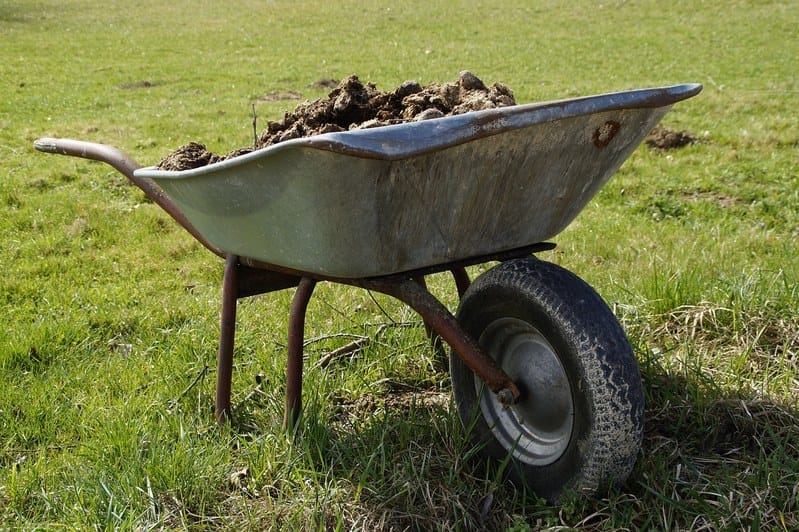Compost vs Manure


Both compost and manure are important soil amendments that can enhance soil fertility, structure and overall health. The decision to choose between compost and manure depends on several factors and in certain situations, a combination of both can be advantageous. Let's take a look at the main differences between these two materials:
Manure:
- Source: Manure is organic material that comes from the waste of animals, such as cows, horses, chickens, pigs, and others.
- Composition: It includes animal excreta (feces and urine), bedding materials (straw, hay), and sometimes uneaten feed.
- Nutrient Content: Manure is rich in nutrients, especially nitrogen. The nutrient content can vary depending on the animal source and diet.
- C:N Ratio: Manure tends to have a lower carbon-to-nitrogen (C:N) ratio, making it higher in nitrogen compared to compost.
- Aging: Fresh manure can be "hot" or high in salts and may contain pathogens. To avoid these issues, manure is often aged or composted before use in gardens.
Compost:
- Source: Compost is a mixture of various organic materials, including kitchen scraps, yard waste, leaves, and other plant matter.
- Composition: It results from the decomposition of a diverse mix of organic materials under controlled conditions.
- Nutrient Content: Compost is a balanced source of nutrients, including nitrogen, phosphorus, potassium, and a range of micronutrients. The nutrient content depends on the materials used in the composting process.
- C:N Ratio: Compost generally has a higher carbon-to-nitrogen (C:N) ratio compared to manure, contributing to soil structure and water retention.
- Stabilization: Composting is a controlled process that involves the breakdown of organic matter by microorganisms. It stabilizes the materials, reduces odours, and eliminates pathogens.
Differences Summary:
- Source: Manure comes from animal waste, while compost is a mix of various plant and kitchen materials.
- Composition: Manure includes animal waste and bedding, while compost is a diverse mix of plant matter.
- Nutrient Content: Manure is richer in nitrogen, while compost provides a more balanced range of nutrients.
- C:N Ratio: Manure has a lower C:N ratio and compost has a higher C:N ratio.
- Aging: Manure needs to be aged or composted to reduce hotness and potential pathogens while composting is the process of breaking down materials under controlled conditions.

Should I use manure or compost?
When considering whether to use compost, manure (or a mixture of both) as a soil amendment, there are several factors to take into account. Here are the key characteristics that differentiate one from the other:
Compost:
- Nutrient-Rich: Compost is a nutrient-rich organic matter that results from the decomposition of various organic materials like kitchen scraps, yard waste, and plant matter.
- Well-Balanced: Compost generally has a well-balanced mix of nitrogen (greens) and carbon (browns), providing plants with a broad spectrum of nutrients.
- Soil Structure: Compost improves soil structure, water retention, and drainage. It also enhances microbial activity in the soil.
- pH Neutral: Compost is usually close to pH neutral, making it suitable for a wide range of plants.
Manure:
- High in Nitrogen: Manure, especially from animals like chickens, cows, or horses, is often rich in nitrogen, making it a good source of this essential nutrient for plants.
- Organic Matter: Manure adds organic matter to the soil, improving soil structure and promoting microbial activity.
- Fast-Acting: Manure can provide a relatively quick release of nutrients to plants, promoting faster growth.
- Considerations: Some manures may have a strong odour and can be "hot" or high in salts, so they should be aged or composted before use to avoid burning plant roots.
Considerations for Choosing:
- Application Timing: Compost can be applied at any time, while fresh manure should be composted or aged before use to avoid potential issues with pathogens and nutrient imbalances.
- Nutrient Needs: Consider the nutrient requirements of your plants. If your soil lacks nitrogen, manure might be a good choice. For a well-rounded nutrient boost, compost is beneficial.
- Availability: Consider what is readily available to you. Both compost and well-aged manure can be effective, so availability and convenience might influence your choice.
- Soil Type: Compost is generally suitable for a wide range of soil types, while the type of manure may influence its suitability for specific soils.
When it comes to improving soil quality, using a combination of compost and well-aged manure can be an effective approach. However, it's crucial to first test your soil and determine the nutrient requirements of your plants. Additionally, it's important to consider the specific characteristics of the compost or manure you plan to use.





